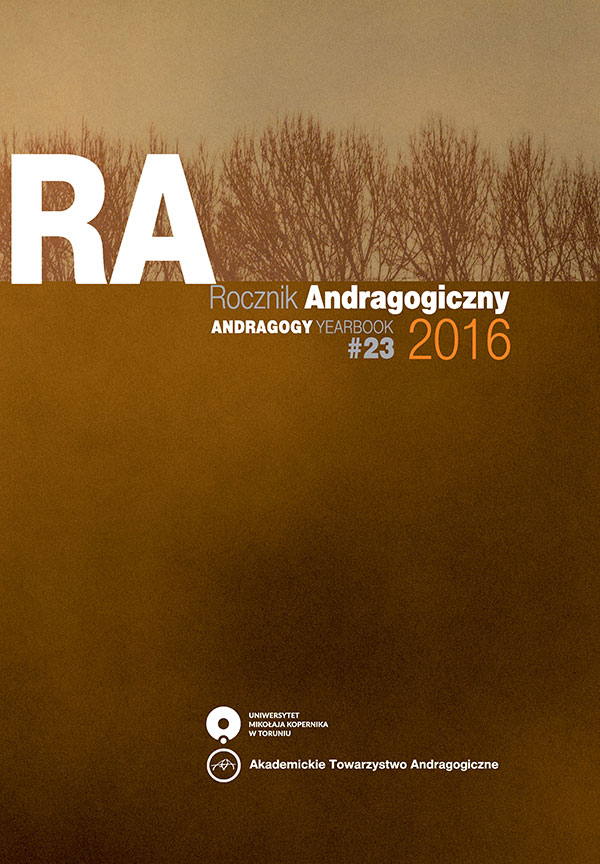Fieldnotes – Status, Processing and Research Potential
DOI:
https://doi.org/10.12775/RA.2016.017Keywords
fieldnotes, fieldnotes processing, qualitative researchAbstract
Qualitative research is specifically based on data gathered from various sources. One of such sources are fieldnotes recorded by researchers in the form of memoirs, personal diaries, institutional records, and various notes taken in the course of field research. Recorded according to very individual and personal criteria, fieldnotes are not designed to be presented to external readers. Nevertheless, a large proportion of such notes is included in the final research report. Based on my personal research experience, in this paper I discuss the role and research potential of recorded and then properly processed fieldnotes.References
Charmaz K. (2009), Teoria ugruntowana. Praktyczny przewodnik po analizie jakościowej, Wyd. Naukowe PWN, Warszawa.
Clifford J. (1990), Notes on (field)notes, [w:] Sanjek R. (red.), Fieldnotes. The Makings of Antropology, Cornell University Press, Ithaca, s. 47–70
Emerson R. (1995), Processing Fieldnotes: Coding and Memoing, [w:] Emerson R., Fretz R., Shaw L. (red.), Writing ethnographic fieldnotes, Chicago: The University of Chicago Press, s. 142–168.
Glaser B. G., Strauss A. L. (2009), Odkrywanie teorii ugruntowanej, Zakład Wydawniczy NOMOS, Kraków.
Hammersley M., Atkinson P. (1995), Metody badań terenowych, Wyd. Zys i S-ka, Poznań.
Jackson J .E. (1990), „I am fieldnote”: Fieldnotes as a Symbol of Professional Identity, [w:] Sanjek R.(red.), Fieldnotes. The Makings of Antropology, Cornell University Press, Ithaca, s. 4–33.
Kaniowska K. (1995), Czy trudno jest być dzisiaj antropologiem?, „Lud”, t. 78, s. 279–291.
Kędzierska H. (2012), Kariery zawodowe nauczycieli. Konteksty – wzory – pola dyskursu, Wyd. Adam Marszałek, Toruń.
Kędzierska H. (2015), Novice Teachers: The Process of “Anchoring” in the Teaching Profession, „Forum Oświatowe”, nr 2, s. 59–73.
Klus-Stańska D. (2016), Odwrót od rozwoju: kontrowersyjna czy obiecująca zmiana paradygmatu wczesnej edukacji, „Studia Edukacyjne”, nr 38, s. 7–20.
Kwieciński Z. (2007), Między patosem a dekadencją. Studia i szkice socjopedagogiczne, Wyd. Naukowe DSWE TWP ,Wrocław.
Lofland J., Snow, D. A., Anderson L., Lofland L. H. (2009), Analiza układów społecznych. Przewodnik metodologiczny po badaniach jakościowych, Wyd. Naukowe SCHOLAR, Warszawa.
Maharaj N. (2016), Using field notes to facilitate critical reflection, „Reflective Practice”, vol. 17 no. 2, s. 114–124.
Rakoczy M. (2014), „Pisanie” kultury a notatki terenowe – przypadek Bronisława Malinowskiego, „Zeszyty Etnologii Wrocławskiej”, nr 2(21), s. 75–94.
Walford G. (2009), The practice of writing ethnographic field notes, „Etnography and Education” vol. 4, no. 2, s. 117–130.
Neografia
Kruszelnicki W. (2012), Hermeneutyczne kierunki refleksji nad osobą badacza w terenie,
„Kultura i Historia”, nr 21, http://www.kulturaihistoria.umcs.lublin.pl/archives/35, dostęp: 15.12.2016.
Soroko E. (2009), Raportowanie badań jakościowych i ilościowych. Ukryte podobieństwa i wyraźne różnice, http://www.staff.amu.edu.pl/~soroko/_uploads/2008/03/jakosciowe-i-ilosciowe_soroko.pdf, dostęp: 15.12.2016.
Downloads
Published
How to Cite
Issue
Section
Stats
Number of views and downloads: 680
Number of citations: 0



